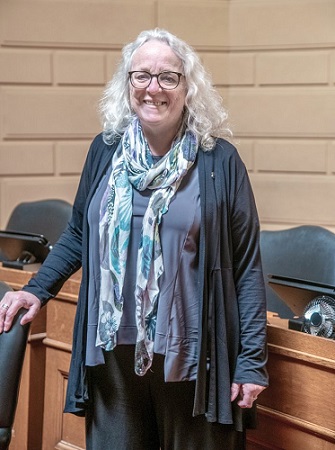State Rep. June Speakman, D-Bristol, will lead a special legislative commission to study low- and moderate-income housing in Rhode Island.
A professor at Roger Williams University, Speakman is a former Barrington Town Council president and a former planning board member in Warren. She was elected to the General Assembly through a special election in 2019 and then reelected in 2020. She spoke to the Providence Business News this week about the task ahead.
PBN: You are the leader of a new state legislative commission on housing. When does the commission begin meeting and what is the schedule?
SPEAKMAN: The formal appointments and the first meeting will be before the end of [July]. I don’t imagine we will get the work done if we meet once a month, so I would prefer twice a month. We do have great staff support at the House. The policy staff will be supporting us and providing us with resources and analysis. It’s not that we’ll meet and talk and do it again in two weeks. There will be policy analysis going on in between meetings.
PBN: What are some of the key issues you would like to start looking at?
SPEAKMAN: The current legislation to encourage the construction of low- and moderate-income housing, that’s the primary focus. That was supposed to bring all communities in Rhode Island up to 10% [affordable-housing stock]. That didn’t happen. We need to take a look at how to change that legislation to try to encourage the production of housing units.
PBN: Can the state require the 10% amount for low- and moderate-income units by a certain point in time?
SPEAKMAN: How do you require a municipality to build housing, right? Municipalities don’t build housing. Private-housing developers do. You have lots of actors in this equation, lots of variables in the equation. You can require communities, and this is the case now, to integrate into their comprehensive community plans a housing element that has an affordable-housing part of it.
The housing element on the Barrington plan is good and it fulfills all the requirements of the law, which is to have multiple strategies for getting [units] built. The problem is you need someone to build them, a developer to look and say, “I can get a density bonus in my building if I include 20% low or moderate units.” I think the model is to have community development corporations do the work because [for] for-profit developers, the housing market is so tight that building market rate units is the way to go.
PBN: Does the state have enough community development corporations to do this?
SPEAKMAN: East Bay has one, the East Bay Community Development Corp. They did two of the developments in Barrington. And then West Elmwood [Housing Development Corp.], which is not in Barrington, came in and did 11 houses. CDCs are not tied to their [communities].
PBN: You have been involved with affordable housing for many years. Do you feel that something statewide has finally switched toward creation this year?
SPEAKMAN: What switched is the housing market is so hot. And … [House] Speaker [K. Joseph] Shekarchi has said housing is one of his priorities. And that’s new. Most states don’t have a comprehensive housing policy. You can’t blame private developers from building market rate housing. They’re in the business of making money. So, government has to come in and make up for those [low and moderate units]. And the integration of the housing czar into [R.I. Commerce Corp.], to have someone in upper administration whose job it is to think about housing, we haven’t had that before.
Mary MacDonald is a staff writer for the PBN. Contact her at MacDonald@PBN.com.













